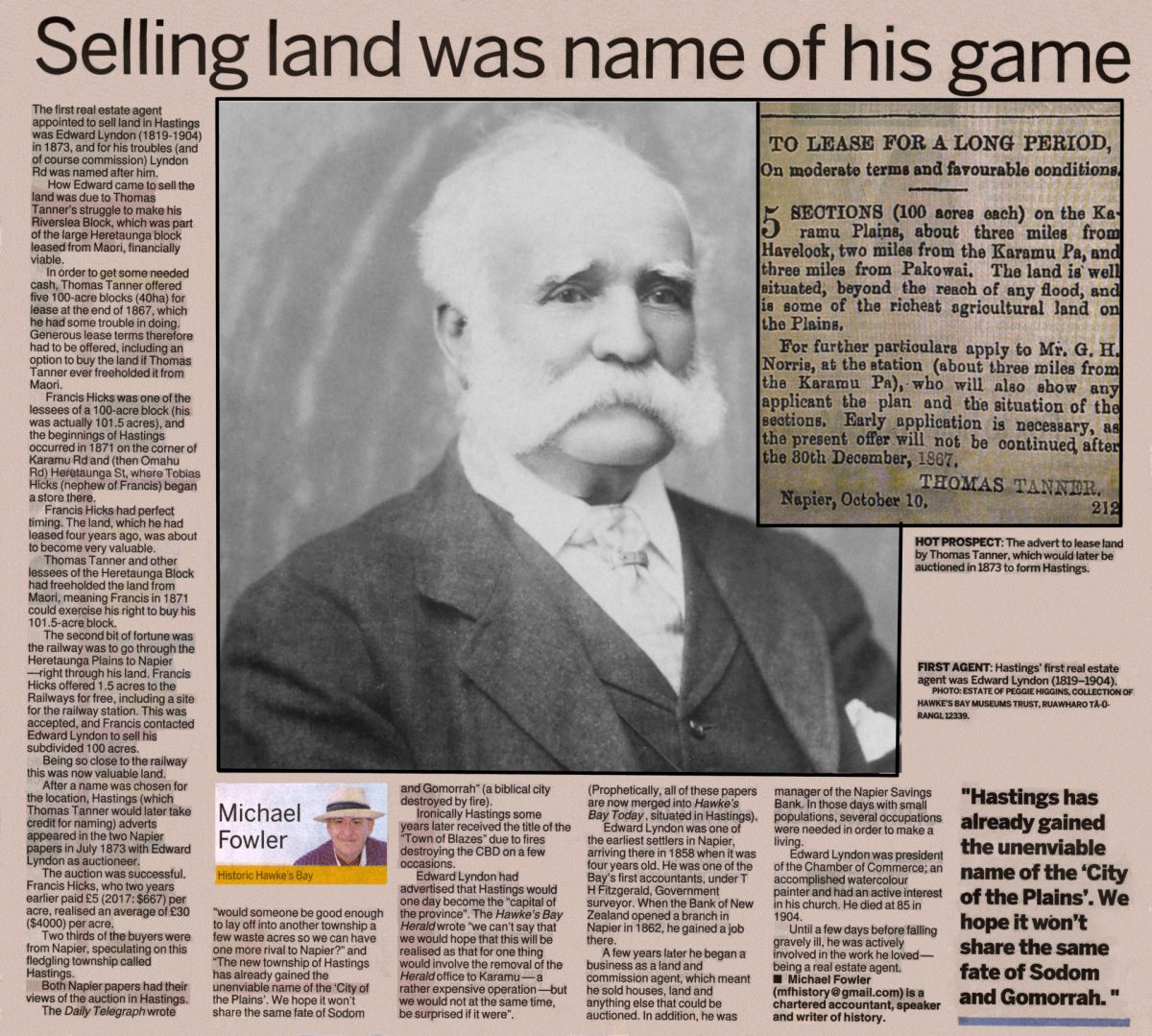Selling land was name of his game
The first real estate agent appointed to sell land in Hastings was Edward Lyndon (1819-1904) in 1873, and for his troubles (and of course commission) Lyndon Rd was named after him.
How Edward came to sell the land was due to Thomas Tanner’s struggle to make his Riverslea Block, which was part of the large Heretaunga block leased from Maori, financially viable.
In order to get some needed cash, Thomas Tanner offered five 100-acre blocks (40ha) for lease at the end of 1867, which he had some trouble in doing. Generous lease terms therefore had to be offered, including an option to buy the land if Thomas Tanner ever freeholded it from Maori.
Francis Hicks was one of the lessees of a 100-acre block (his was actually 101.5 acres), and the beginnings of Hastings occurred in 1871 on the corner of Karamu Rd and (then Omahu Rd) Heretaunga St, where Tobias Hicks (nephew of Francis) began a store there.
Francis Hicks had perfect timing. The land, which he had leased four years ago, was about to become very valuable.
Thomas Tanner and other lessees of the Heretaunga Block had freeholded the land from Maori, meaning Francis in 1871 could exercise his right to buy his 101.5-acre block.
The second bit of fortune was the railway was to go through the Heretaunga Plains to Napier – right through his land. Francis Hicks offered 1.5 acres to the Railways for free, including a site for the railway station. This was accepted, and Francis contacted Edward Lyndon to sell his subdivided 100 acres.
Being so close to the railway this was now valuable land.
After a name was chosen for the location, Hastings (which Thomas Tanner would later take credit for naming) adverts appeared in the two Napier papers in July 1873 with Edward Lyndon as auctioneer.
The auction was successful. Francis Hicks, who two years earlier paid £5 (2017: $667) per acre, realised an average of £30 ($4000) per acre.
Two thirds of the buyers were from Napier, speculating on this fledgling township called Hastings.
Both Napier papers had their views of the auction in Hastings.
The Daily Telegraph wrote “would someone be good enough to lay off into another township a few waste acres so we can have one more rival to Napier?” and “The new township of Hastings has already gained the unenviable name of the ‘City of the Plains’. We hope it won’t share the same fate of Sodom and Gomorrah” (a biblical city destroyed by fire).
Ironically Hastings some years later received the title of the “Town of Blazes” due to fires destroying the CBD on a few occasions.
Edward Lyndon had advertised that Hastings would one day become the “capital of the province”. The Hawke’s Bay Herald wrote “we can’t say that we would hope that this will be realised as that for one thing would involve the removal of the Herald office to Karamu – a rather expensive operation – but we would not at the same time, be surprised if it were”.
(Prophetically, all of these papers are now merged into Hawke’s Bay Today, situated in Hastings).
Edward Lyndon was one of the earliest settlers in Napier, arriving there in 1858 when it was four years old. He was one of the Bay’s first accountants, under T H Fitzgerald, Government surveyor. When the Bank of New Zealand opened a branch in Napier in 1862, he gained a job there.
A few years later he began a business as a land and commission agent, which meant he sold houses, land and anything else that could be auctioned. In addition, he was manager of the Napier Savings Bank. In those days with small populations, several occupations were needed in order to make a living.
Edward Lyndon was president of the Chamber of Commerce; an accomplished watercolour painter and had an active interest in his church. He died at 85 in 1904.
Until a few days before falling gravely ill, he was actively involved in the work he loved – being a real estate agent.
Michael Fowler ([email protected]) is a chartered accountant, speaker and writer of history.
“Hastings has already gained the unenviable name of the ‘City of the Plains’. We hope it won’t share the same fate of Sodom and Gomorrah.”
[Advertisement]
TO LEASE FOR A LONG PERIOD,On moderate terms and favourable conditions.
5 SECTIONS (100 acres each) on the Karamu Plains, about three miles from Havelock, two miles from the Karamu Pa, and three miles from Pakowai [Pakowhai]. The land is well situated, beyond the reach of any flood, and is some of the richest agricultural land on the Plains.For further particulars apply to Mr. G.H. Norris, at the station (about three miles from the Karamu Pa), who will also show any applicant the plan and the situation of the sections. Early application is necessary, as the present offer will not be continued after the 30th December, 1867.
THOMAS TANNER
Napier, October 10. 212
Photo captions –
HOT PROSPECT: The advert to lease land by Thomas Tanner, which would later be auctioned in 1873 to form Hastings.
FIRST AGENT: Hastings’ first real estate agent was Edward Lyndon (1819-1904).
PHOTO: ESTATE OF PEGGIE HIGGINS, COLLECTION OF HAWKE’S BAY MUSEUMS TRUST, RUAWHARO TA-O-RANGI, 12339












Do you know something about this record?
Please note we cannot verify the accuracy of any information posted by the community.